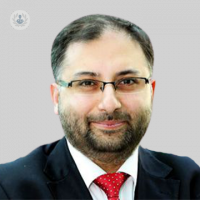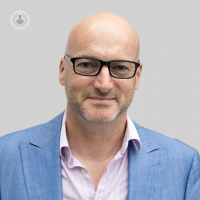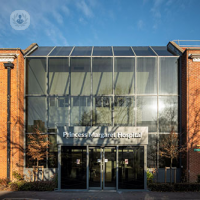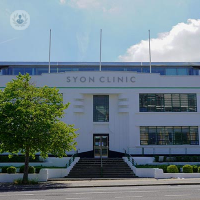What is an arrhythmia?
An arrhythmia is also known as a heart rhythm problem, causing the heart to either beat too fast (tachycardia), too slow (bradycardia) or to have an irregular pattern. This results when the electrical pulses that coordinate the heartbeats do not work properly.
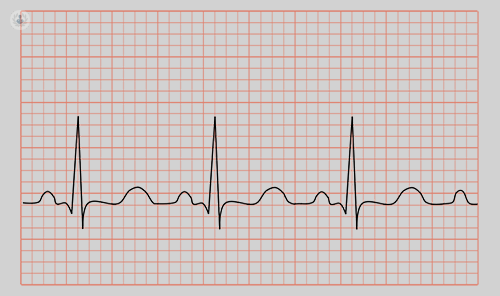
What are the symptoms of arrhythmia?
People with an arrhythmia may not experience any symptoms, but a prominent arrhythmia may result in the following symptoms:
- Palpitations
- Dizziness and vertigo
- Fainting (syncope)
- Chest pain
- Difficulty breathing
- Sweating
What causes an arrhythmia?
In some cases, arrhythmias may arise in patients who do not have any other abnormalities. In other cases, arrhythmias may be secondary to other abnormalities.
Potential secondary causes include:
- Heart attack or damage to the myocardium from a heart attack in the past
- Heart failure or enlargement of the heart
- Congenital heart disease
- High blood pressure (hypertension)
- Hyperthyroidism
- Abnormal levels of potassium or other substances in the body
- Smoking
- Too much caffeine or alcohol
- Stress
- Diabetes
- Genetic causes
- Recreational drug use
What is the treatment for arrhythmia?
Mild arrhythmias often won’t require treatment, but when an arrhythmia is serious treatment will be required.
Treatment can consist of:
- Medication – to control the heart beat better
- Catheter ablation – minimally-invasive procedure that destroys diseased tissue in the heart causing the arrhythmia
- Cardioversion – electric shocks are used to return the heart beat to a normal rhythm
In specific circumstances, a pacemaker or ICD (a device that monitors heart rhythm, and uses small shocks to maintain a normal rhythm), may be required.
11-13-2012 06-07-2023Arrhythmia
Dr Saagar Mahida - Cardiology
Created on: 11-13-2012
Updated on: 06-07-2023
Edited by: Aoife Maguire
What is an arrhythmia?
An arrhythmia is also known as a heart rhythm problem, causing the heart to either beat too fast (tachycardia), too slow (bradycardia) or to have an irregular pattern. This results when the electrical pulses that coordinate the heartbeats do not work properly.

What are the symptoms of arrhythmia?
People with an arrhythmia may not experience any symptoms, but a prominent arrhythmia may result in the following symptoms:
- Palpitations
- Dizziness and vertigo
- Fainting (syncope)
- Chest pain
- Difficulty breathing
- Sweating
What causes an arrhythmia?
In some cases, arrhythmias may arise in patients who do not have any other abnormalities. In other cases, arrhythmias may be secondary to other abnormalities.
Potential secondary causes include:
- Heart attack or damage to the myocardium from a heart attack in the past
- Heart failure or enlargement of the heart
- Congenital heart disease
- High blood pressure (hypertension)
- Hyperthyroidism
- Abnormal levels of potassium or other substances in the body
- Smoking
- Too much caffeine or alcohol
- Stress
- Diabetes
- Genetic causes
- Recreational drug use
What is the treatment for arrhythmia?
Mild arrhythmias often won’t require treatment, but when an arrhythmia is serious treatment will be required.
Treatment can consist of:
- Medication – to control the heart beat better
- Catheter ablation – minimally-invasive procedure that destroys diseased tissue in the heart causing the arrhythmia
- Cardioversion – electric shocks are used to return the heart beat to a normal rhythm
In specific circumstances, a pacemaker or ICD (a device that monitors heart rhythm, and uses small shocks to maintain a normal rhythm), may be required.


Advances in atrial fibrillation ablation technology
By Dr Saagar Mahida
2024-11-21
Highly respected consultant cardiologist and cardiac electrophysiologist Dr Saagar Mahida details recent advances in atrial fibrillation ablation technology in this informative article. See more
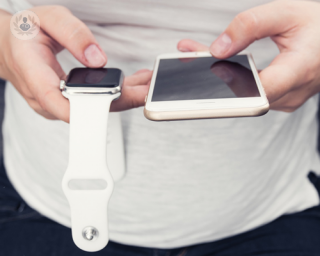

Screen for AF with your smartwatch or smartphone
By Professor Dhiraj Gupta
2024-11-21
Researchers have recognised smartphone and smartwatches' potential for pinpointing possibly live-saving information which can assist in diagnosing atrial fibrillation (AF). Leading cardiologist Professor Dhiraj Gupta, who is also an advisor to the British Heart Foundation (BHF) on AF, speaks to Top Doctors all about the Preventicus Heartbeats app, and other useful apps and tech equipment which can potentially detect the condition – as well as exactly what it is - in this informative article. See more
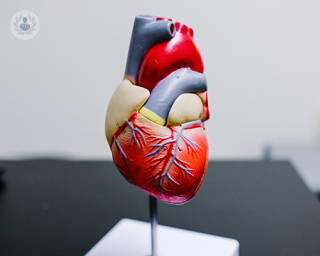

When the first ablation fails: Arrhythmia after atrial ablation
By Professor Mark Gallagher
2024-11-21
If you experience arrhythmia, a doctor may recommend atrial ablation to burn and destroy the abnormal area of heart tissue that is causing the arrhythmia. While ablation will generally restore your normal heart rhythm, it is important to remember that arrhythmia may still occur after the procedure, in some cases. Here to provide a detailed insight into arrhythmia after atrial ablation, including causes, prevention and treatment, is esteemed cardiologist, Dr Mark Gallagher. See more
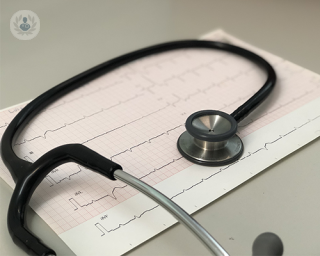

Are ectopic heartbeats dangerous?
By Dr Boon Lim
2024-11-21
Many of us experience ectopic heartbeats without any cause for concern, but when are they considered dangerous? Dr Boon Lim explains all you need to know about these abnormal heartbeats and when to seek medical help. See more
Experts in Arrhythmia
-
Dr Fakhar Khan
CardiologyExpert in:
- Atrial Fibrillation
- Electrophysiology study
- Dilated cardiomyopathy
- Electrocardiogram
- Pacemaker
- Arrhythmia
-
Dr Boon Lim
CardiologyExpert in:
- Cardiac (catheter) ablation
- Implantable cardioverter defibrillator (ICD)
- Arrhythmia
- Syncope
- Pacemaker
- Atrial Fibrillation
-
Dr Nick Linton
CardiologyExpert in:
- Atrial Fibrillation
- Arrhythmia
- Hypertension (high blood pressure)
- Cardiomyopathy
- Heart attack
- Heart murmur
-
Dr Syed Ahsan
CardiologyExpert in:
- Arrhythmia
- Cardiac (catheter) ablation
- Atrial Fibrillation
- Chest pain
- Pacemaker
- Palpitations
-
Dr Martin Lowe
CardiologyExpert in:
- Atrial Fibrillation
- Palpitations
- Cardiac (catheter) ablation
- Arrhythmia
- Pacemaker
- See all

The Princess Margaret Hospital - part of Circle Health Group
The Princess Margaret Hospital - part of Circle Health Group
Osborne Rd, Windsor SL4 3SJ
No existe teléfono en el centro.
By using the telephone number provided by TOP DOCTORS, you automatically agree to let us use your phone number for statistical and commercial purposes. For further information, read our Privacy Policy
Top Doctors

OneWelbeck Heart Health
OneWelbeck Heart Health
Floor 3, 1 Welbeck St, London, W1G 0AR
No existe teléfono en el centro.
By using the telephone number provided by TOP DOCTORS, you automatically agree to let us use your phone number for statistical and commercial purposes. For further information, read our Privacy Policy
Top Doctors

Syon Clinic - part of Circle Health Group
Syon Clinic - part of Circle Health Group
941 Great West Rd, Brentford TW8 9DU
No existe teléfono en el centro.
By using the telephone number provided by TOP DOCTORS, you automatically agree to let us use your phone number for statistical and commercial purposes. For further information, read our Privacy Policy
Top Doctors
-
The Princess Margaret Hospital - part of Circle Health Group
Osborne Rd, Windsor SL4 3SJ, WindsorExpert in:
- Brachytherapy
- Cardiology
- General Surgery
- Orthopaedic surgery
- Robotic Surgery
- Dermatology
-
OneWelbeck Heart Health
Floor 3, 1 Welbeck St, London, W1G 0AR, W1G Marylebone LondonExpert in:
- Clinical analysis
- Arrhythmia
- Palpitations
-
Syon Clinic - part of Circle Health Group
941 Great West Rd, Brentford TW8 9DU, West LondonExpert in:
- Allergies nose and ears
- Allergy Dermatitis
- Allergy
- Clinical analysis
- Anxiety
- Digestive
- See all
- Most viewed diseases, medical tests, and treatments
- Autoimmune diseases
- Joint pain
- Nutrition
- Genetic testing
- Abdominal pain
- Minimal access surgery (keyhole surgery)
- Vaginal cytology
- Heart murmur in children
- Aortic aneurysms
- Parkinson's disease

